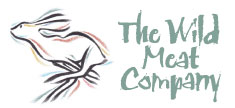Our game meat
All our game birds and animals are harvested (normally shot) from our own or neighbouring farms and estates in East Anglia. Being close to the coast we are fortunate in having a large number of migratory birds such as wild duck in the autumn and woodcock later in winter. Both are fantastic eating and highly recommended to the game connoisseur.
We are also lucky in having very high populations of resident wild game, such as hares, which are not common in most of the country. This is because of the mixed farming systems and the mix of land use types prevalent on the coast, from forestry, to marshland, to irrigated vegetable crops and conventional combinable crops. Together with predator control, this means hares have a variety of habitats in which they can breed successfully, and a variety of food sources.
Game in our diet
Game meat, from wild animals, is very low in fat. Venison has 1% fat compared to 10% with lamb or 11% with beef and wild birds like pheasants and partridges is 50% lower in fat content than chicken.
The wild animals that produce our game meat eat a natural foraged diet, rather than mass-produced animal feed. This means that as well as being leaner, their meat has more flavour and is sustainable.
Game meat is one of the constituents of the Paleo diet (or ‘Caveman’ diet). Lean meat, fish, fruit and nuts was our diet as hunter gatherers for 30,000 years until humans started farming wheat and other cereals around 2000 years ago. Our digestion system has not yet evolved to digest high carbohydrate, high gluten diets.
Welfare during life and at death
The popularity of game is in part due to the good life and humane death of animals or birds, for which life in the wild in their natural state must be preferable to being intensively farmed in a building. Free range and organic farming systems come closer to offering animals and birds a natural, stress-free life but living in the wild has to be the gold standard of animal welfare.
The greatest benefit of eating wild meat is that the animals do not have to endure the stress of an abattoir or slaughterhouse. The animal is killed instantly by a trained hunter and marksman so it does not have to endure the sight, smells and sounds of other animals being killed around it. They are not aware that death is imminent and are in their familiar natural surroundings. Occasionally, and rarely, an animal may be wounded but in that unfortunate circumstance the hunter is trained to kill the animal or bird immediately.
We also believe that the animals natural diet produces great tasting meat so there are many reasons to eat more game!
Production


After being shot, the game is collected or delivered to our cold store where it is hung for between three to seven days at a temperature of between 0 and +4ºC. It is then processed through our preparation, cutting and packing rooms to order.
Birds are dry plucked, waxed and eviscerated by hand before being tray wrapped.
Deer are eviscerated in the field and their head and feet removed by the stalker who shot them. The carcass is then either delivered or collected by us and skinned by hand before being taken to the butchery room where the venison is cut to order.
The whole process is approved by the Council Environmental Health Officer, who also checks that our traceability system works so that every batch of products can be traced back to the source.
We are also audited by SALSA - a robust and effective food safety certification scheme that requires us to demonstrate to an auditor that we are able to produce safe and legal food and are committed to continually meeting the requirements of the SALSA standard.
Sustainability

The Wild Meat Company are proud recipients of a Silver award from the Suffolk Carbon Charter in recognition of our commitment to minimising our energy use and carbon emissions and we continue to support the work of the Country Food Trust, a unique charity using game meat to produce top quality protein based food to donate to charities who feed people in need.
Distribution & retail
We sell our game through our online shop as well as some selected food events. We also wholesale via our online shop here >




